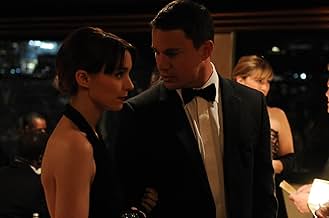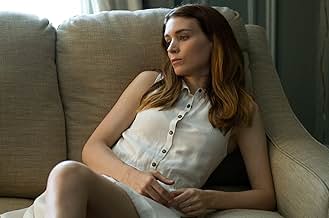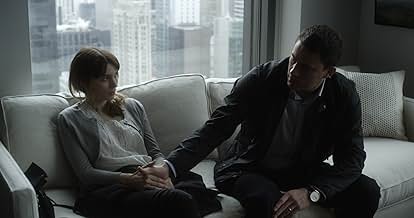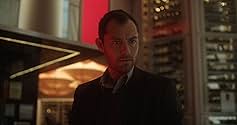Le monde d'une jeune femme s'effondre lorsqu'un médicament prescrit par son psychiatre a des effets secondaires inattendus.Le monde d'une jeune femme s'effondre lorsqu'un médicament prescrit par son psychiatre a des effets secondaires inattendus.Le monde d'une jeune femme s'effondre lorsqu'un médicament prescrit par son psychiatre a des effets secondaires inattendus.
- Prix
- 5 nominations au total
Avis en vedette
Steven Soderbergh is a chameleon of a director and one of the few who has the ability to move from critically acclaimed Hollywood blockbusters, like Ocean's Eleven, to dramatic art films like The Limey. He is also one of the hardest working filmmakers today, taking on such roles as producer, writer, director, cinematographer and editor. As a director, he has been able to pump out two feature length films in a single year and he has done this more than just once. However, over the last decade his films have become weaker as it seems as though not enough time has been invested into exploring the emotional depths of the stories he is bringing to life. Therefore they lack the ability to conjure genuine emotion from their audience. It almost seems as if he does not care about whether or not audiences are moved or entertained, but rather is just doing his job, moving from one project to the next.
At the beginning of the year it was announced that Soderbergh was retiring as a director and that SIDE EFFECTS would be his last theatrical film release. In an interview with New York Magazine, he stated: "The worst development in filmmaking—particularly in the last five years—is how badly directors are treated. It's become absolutely horrible the way the people with the money decide they can fart in the kitchen, to put it bluntly."
Rooney Mara plays Emily, a woman who seems to be suffering from some sort of mental disorder after her husband, Martin, played by Channing Tatum, returns home from prison. After a failed suicide attempt Emily is introduced to Dr. Jonathan Banks, played by Jude Law, a psychiatrist who tries to help her by prescribing her an anti-depressant. As Emily's symptoms worsen, her psychiatrist and her try to find an anti-depressant that works for her. After many failed attempts Dr. Banks takes the advice of Emily's previous doctor, played by Catherine Zeta-Jones, and prescribes her a new experimental medication called Ablixa. The side effects attempt to destroy both of their lives.
Side Effects is shot and paced like a serious, well-crafted art film studying the truth behind depression which slowly builds into one hell of a tense thriller. What hold the film back is the ending. By the end this serious, well-crafted art film has succumb to a Hollywood twist gimmick popcorn flick better suited for the late 90's. I couldn't help thinking that someone had farted in the kitchen. I do not know if Soderbergh was just following the screenplay or if he was told to give it a happy ending that over-explains everything, leaving no sense of mystery and easily spotted plot-holes.
Of course, even with the out-of-place, poorly written surprise conclusion, Side Effects is still better than the majority of thrillers being produced today. And though it disappoints, the ride up until that point was mesmerizing and thought-provoking.
At the beginning of the year it was announced that Soderbergh was retiring as a director and that SIDE EFFECTS would be his last theatrical film release. In an interview with New York Magazine, he stated: "The worst development in filmmaking—particularly in the last five years—is how badly directors are treated. It's become absolutely horrible the way the people with the money decide they can fart in the kitchen, to put it bluntly."
Rooney Mara plays Emily, a woman who seems to be suffering from some sort of mental disorder after her husband, Martin, played by Channing Tatum, returns home from prison. After a failed suicide attempt Emily is introduced to Dr. Jonathan Banks, played by Jude Law, a psychiatrist who tries to help her by prescribing her an anti-depressant. As Emily's symptoms worsen, her psychiatrist and her try to find an anti-depressant that works for her. After many failed attempts Dr. Banks takes the advice of Emily's previous doctor, played by Catherine Zeta-Jones, and prescribes her a new experimental medication called Ablixa. The side effects attempt to destroy both of their lives.
Side Effects is shot and paced like a serious, well-crafted art film studying the truth behind depression which slowly builds into one hell of a tense thriller. What hold the film back is the ending. By the end this serious, well-crafted art film has succumb to a Hollywood twist gimmick popcorn flick better suited for the late 90's. I couldn't help thinking that someone had farted in the kitchen. I do not know if Soderbergh was just following the screenplay or if he was told to give it a happy ending that over-explains everything, leaving no sense of mystery and easily spotted plot-holes.
Of course, even with the out-of-place, poorly written surprise conclusion, Side Effects is still better than the majority of thrillers being produced today. And though it disappoints, the ride up until that point was mesmerizing and thought-provoking.
Good, but not great, crime-drama. Starts well: set up is good, character and plot development is interesting. Set up for an intriguing finish, especially as Jude Law's character is presented with a conundrum.
However, just when you're hooked, cracks start to develop in the plot. Not that the plot has holes, it just starts to get rather far-fetched. Too many twists, some just for twists' sake.
Ending feels contrived and a tad too neat.
However, still an interesting movie.
Good performance from Jude Law and Rooney Mara in the main roles. Catherine Zeta-Jones just doesn't feel right in her role, however. She's maybe too intense, or too one-dimensional.
Channing Tatum is okay in his role.
However, just when you're hooked, cracks start to develop in the plot. Not that the plot has holes, it just starts to get rather far-fetched. Too many twists, some just for twists' sake.
Ending feels contrived and a tad too neat.
However, still an interesting movie.
Good performance from Jude Law and Rooney Mara in the main roles. Catherine Zeta-Jones just doesn't feel right in her role, however. She's maybe too intense, or too one-dimensional.
Channing Tatum is okay in his role.
I saw a couple of interviews with the cast before this film came out and they talked about the fact that this film had a lot of twists and turns in it; and they weren't kidding. However, that being said I went in with a certain mindset and it took me a little time to figure it out, but I eventually did. Either the film was moving real slow for me or I have become accustom to seeing more action. This film is purely psychological in nature, so if you are looking for some action, there isn't any. It also got me to thinking how much power court appointed psychologists have and how they have the power to manipulate the system. On the other hand, it also made me realize that mental patients have absolutely no control over their lives (which may be a good thing). Dr. Jonathan Banks (Jude Law) is the psychologist on the case of a severely depressed patient. His world is quickly turned upside down by having to deal with anxiety, depression, pharmaceuticals and medical ethics. Emily Taylor (Rooney Mara) is the severely depressed woman who is desperately trying to find the right drug to cure her affliction. Dr. Victoria Siebert (Catherine Zeta-Jones) is a former attending psychologist of Emily who is consulted by Dr. Banks to try and uncover some of the dilemmas of her past. Martin Taylor (Channing Tatum) is Emily's husband and is shouldered with the responsibility of trying to care his wife as she tries medication after medication in addition to trying to keep the marriage together. Dierdre Banks (Vinessa Shaw) is Jonathan's wife and she becomes a victim and unwilling participant in the unfolding circumstances that is affecting her life. I think that the entire cast did an excellent job, but as I said before it was a tad slow for me in the beginning. This film definitely keeps you on the edge of your seat and you really do not know who is playing whom. It was difficult to know who to root for until all is revealed at the end. I thought that the story was a good one and it definitely takes you on a roller-coaster ride. I am not sure that anyone could ever reach the level of a Hitchcock film, but this one comes pretty close. Steven Soderbergh did an excellent job embracing this genre of film. I give this film a green light.
In "Side Effects", Emily (Rooney Mara) is feeling hopeless, suffering from prolonged effects of abandonment issues, unsure how to proceed in her life. Her husband, Martin (Channing Tatum) has just come home from prison, serving time for insider trading. But Emily doesn't know what she should be feeling; Emily doesn't know how to feel what she should be feeling. Psychiatrist Dr. Jonathan Banks (Jude Law) is exactly what the doctor ordered.
For those of us who watched "Contagion" (2011) and wanted to focus only on Jude Law's morally ambiguous blogger, Alan Krumwiede, we have finally gotten our wish. Law's morally ambiguous Dr. Jon Banks and Mara's psychologically ambiguous Emily are the only two main characters. There is only one story to follow.
It starts off with some strange camera angles (Steven Soderbergh serving as his own director of photography as he has for the majority of his films) but then settles down as a thriller, or what will become a thriller once we get to know the characters better. Emily has tried many antidepressants in the past but most leave her with undesired side effects: nausea, dizziness, or lack of a sex drive. Won't Dr. Banks please prescribe her something different? Sure, how about Ablixa, the new medication which Dr. Banks is being paid to try out on patients.
And although we now think we know in which character evil lies, we do not. Dr. Jonathan Banks is singularly the most complicated, interestingly created character in recent times. He's modern, selfish, compassionate, professionally-oriented, family-oriented, has respect for the legal system, and will go to extremes to distinguish between right and wrong. He's the focus of this character-centric, film noir thriller which uses Mara's Emily as the vehicle for the plot.
A crime is committed. It's bad, really bad. But the question is not who did it, the question is, who is guilty? In answering that question the film weaves from deception through twist to deception, never ceasing our questions of what is morally right, what is morally wrong and who is guilty? The screenplay is incredibly well-written, creating characters that amaze us, disappoint us and deceive us all the while being a part of an interesting and complex story. The dialogue fits with that theme, using words like "hopeless" to tie multiple characters together - conceptually not physically.
It's more of an edge-of-your-mind thriller rather than an edge-of-your- seat thriller. Never really scared, always questioning the moral and psychological behaviour of these characters. The ending takes some strange, sexually-charged turns, and perhaps a bit more conclusive than I was originally expecting, but don't worry, you can still question where the line is between right and wrong and when each character crossed it.
For those of us who watched "Contagion" (2011) and wanted to focus only on Jude Law's morally ambiguous blogger, Alan Krumwiede, we have finally gotten our wish. Law's morally ambiguous Dr. Jon Banks and Mara's psychologically ambiguous Emily are the only two main characters. There is only one story to follow.
It starts off with some strange camera angles (Steven Soderbergh serving as his own director of photography as he has for the majority of his films) but then settles down as a thriller, or what will become a thriller once we get to know the characters better. Emily has tried many antidepressants in the past but most leave her with undesired side effects: nausea, dizziness, or lack of a sex drive. Won't Dr. Banks please prescribe her something different? Sure, how about Ablixa, the new medication which Dr. Banks is being paid to try out on patients.
And although we now think we know in which character evil lies, we do not. Dr. Jonathan Banks is singularly the most complicated, interestingly created character in recent times. He's modern, selfish, compassionate, professionally-oriented, family-oriented, has respect for the legal system, and will go to extremes to distinguish between right and wrong. He's the focus of this character-centric, film noir thriller which uses Mara's Emily as the vehicle for the plot.
A crime is committed. It's bad, really bad. But the question is not who did it, the question is, who is guilty? In answering that question the film weaves from deception through twist to deception, never ceasing our questions of what is morally right, what is morally wrong and who is guilty? The screenplay is incredibly well-written, creating characters that amaze us, disappoint us and deceive us all the while being a part of an interesting and complex story. The dialogue fits with that theme, using words like "hopeless" to tie multiple characters together - conceptually not physically.
It's more of an edge-of-your-mind thriller rather than an edge-of-your- seat thriller. Never really scared, always questioning the moral and psychological behaviour of these characters. The ending takes some strange, sexually-charged turns, and perhaps a bit more conclusive than I was originally expecting, but don't worry, you can still question where the line is between right and wrong and when each character crossed it.
Steven Soderbergh has decided to end his career what can only be described as a pharmaceutical, psychosexual thriller that deals with several morally ambiguous characters all revolving around one horrible incident. Out of fear of giving away the intelligent, twist-filled plot written by Scot Z. Burns, that's really all I can say, although I can tell you that Soderbergh directs the film with extreme confidence, and it shows. He was able to convey a sort of quiet chaos with his frequent close-ups, and, by shifting in-and-out of focus throughout the screen, he was able to draw attention to the many small, yet important details.
The real strength of this film, though, is not necessarily the story itself, but how it is presented. To be honest, the story is almost too smart to the point of absurdity, but it never comes off as such. By releasing only one small piece of information at a time, we are kept waiting through interviews, court hearings, false trails, and many psychiatrist visits until, finally, everything comes together into one neat conclusion. The entire film is very subdued, but if you pay attention, you will be rewarded in the end.
Of course, the story would not have turned out so well without the multiple impressive performances that carry it all the way through. Rooney Mara is once again stunning as Emily Taylor, a woman who starts taking prescription antidepressants to cope with her husband's release from prison. Without giving much away, Emily is far more complex than she first appears, and Mara plays this perfectly by retaining a dark mysteriousness about her. She truly steals every scene she's in, and displays such a range of emotions that, at times, it's difficult to tell what her character is truly thinking. This is unfortunate for Channing Tatum, who does a fine job as her loving and sympathetic husband trying to make everything right after being released for insider trading, but who doesn't have close to enough material to compete with Mara.
Jude Law, on the other hand, is arguably the most central figure as Dr. Jonathan Banks, Emily's psychiatrist who is thrown into a scandal when his patient is involved in a tragic accident after taking an antidepressant he prescribed for her. He slowly mentally unravels as his decisions come back to haunt him, and eventually has to cross several moral boundaries in order to get his life back on track. Law shows this frustration with expert skill, and gives one of the best performances of his recent career. The same can be said for Catherine Zeta- Jones, who—as Emily's former psychiatrist Dr. Victoria Siebert—gives possibly the most complex performance, and does it brilliantly despite her lack of screen time.
To give away any more would be to say too much, as the film is so perfectly structured, it is difficult to discuss without giving away the whole thing. All I can add is, it is not so simple and straightforward as it may appear. It is a complex of characters, their motives, and the consequences of their actions, and, despite taking a while to get started, it is truly a spectacular, thrilling, and intricate journey that should not be missed.
The real strength of this film, though, is not necessarily the story itself, but how it is presented. To be honest, the story is almost too smart to the point of absurdity, but it never comes off as such. By releasing only one small piece of information at a time, we are kept waiting through interviews, court hearings, false trails, and many psychiatrist visits until, finally, everything comes together into one neat conclusion. The entire film is very subdued, but if you pay attention, you will be rewarded in the end.
Of course, the story would not have turned out so well without the multiple impressive performances that carry it all the way through. Rooney Mara is once again stunning as Emily Taylor, a woman who starts taking prescription antidepressants to cope with her husband's release from prison. Without giving much away, Emily is far more complex than she first appears, and Mara plays this perfectly by retaining a dark mysteriousness about her. She truly steals every scene she's in, and displays such a range of emotions that, at times, it's difficult to tell what her character is truly thinking. This is unfortunate for Channing Tatum, who does a fine job as her loving and sympathetic husband trying to make everything right after being released for insider trading, but who doesn't have close to enough material to compete with Mara.
Jude Law, on the other hand, is arguably the most central figure as Dr. Jonathan Banks, Emily's psychiatrist who is thrown into a scandal when his patient is involved in a tragic accident after taking an antidepressant he prescribed for her. He slowly mentally unravels as his decisions come back to haunt him, and eventually has to cross several moral boundaries in order to get his life back on track. Law shows this frustration with expert skill, and gives one of the best performances of his recent career. The same can be said for Catherine Zeta- Jones, who—as Emily's former psychiatrist Dr. Victoria Siebert—gives possibly the most complex performance, and does it brilliantly despite her lack of screen time.
To give away any more would be to say too much, as the film is so perfectly structured, it is difficult to discuss without giving away the whole thing. All I can add is, it is not so simple and straightforward as it may appear. It is a complex of characters, their motives, and the consequences of their actions, and, despite taking a while to get started, it is truly a spectacular, thrilling, and intricate journey that should not be missed.
Le saviez-vous
- GaffesDr. Banks would never have been allowed to be an expert witness in a case in which he was the defendant's psychiatrist. This would present a blatant conflict of interest. He could only be a fact witness.
- Citations
Dr. Jonathan Banks: Depression is an inability to construct a future.
- ConnexionsFeatured in The Tonight Show with Jay Leno: Episode #21.81 (2013)
- Bandes originalesThe Forgotten People
Performed by Thievery Corporation
Written by Rob Garza (as Robert Garza) and Eric Hilton
Courtesy of ESL Music
Meilleurs choix
Connectez-vous pour évaluer et surveiller les recommandations personnalisées
Détails
- Date de sortie
- Pays d’origine
- Sites officiels
- Langues
- Aussi connu sous le nom de
- Side Effects
- Lieux de tournage
- sociétés de production
- Consultez plus de crédits d'entreprise sur IMDbPro
Box-office
- Budget
- 30 000 000 $ US (estimation)
- Brut – États-Unis et Canada
- 32 172 757 $ US
- Fin de semaine d'ouverture – États-Unis et Canada
- 9 303 145 $ US
- 10 févr. 2013
- Brut – à l'échelle mondiale
- 63 414 135 $ US
- Durée1 heure 46 minutes
- Couleur
- Mixage
- Rapport de forme
- 1.85 : 1
Contribuer à cette page
Suggérer une modification ou ajouter du contenu manquant








































